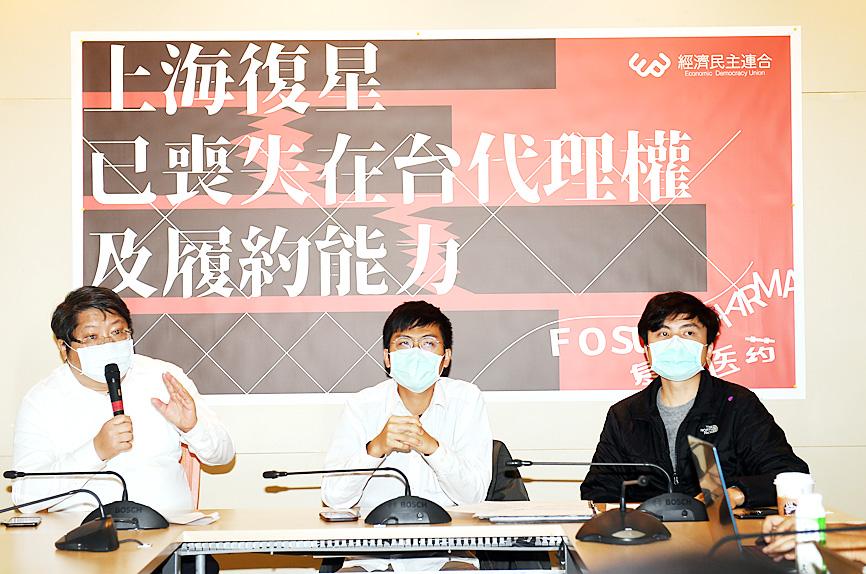Shanghai Fosun Pharmaceutical Group might have lost its right to distribute the Pfizer-BioNTech vaccine for COVID-19 and the ability to fulfill a contract in Taiwan, civic groups Taiwan Citizen Front and the Economic Democracy Union said yesterday.
In a radio interview on Feb. 17, Minister of Health and Welfare Chen Shih-chung (陳時中), head of the Central Epidemic Command Center, said that last year, Taiwan was close to signing a contract to buy doses of the Pfizer-BioNTech vaccine, but that the deal was halted at the last moment, with some speculating that Chinese interference was to blame.
On Monday last week, the center said that it had since November last year been negotiating a deal directly with German vaccine maker BioNTech.

Photo: CNA
Some in the Chinese Nationalist Party (KMT) questioned why the center did not try to negotiate a deal through Pfizer-BioNTech’s Chinese partner, Shanghai Fosun Pharmaceutical Group, which obtained the right to market and distribute the Pfizer-BioNTech vaccine in Taiwan and China, including Macau and Hong Kong.
In March last year, a Shanghai Fosun statement on the Shanghai Stock Exchange’s Web site confirmed that the company was authorized to develop and market the vaccine in Taiwan and China, Taiwan Citizen Front member Hsu Kuang-tse (許冠澤) said.
However, in the middle of December last year, the company released a modified contract, including a profit allocation plan with BioNTech that listed China, Hong Kong and Macau, but not Taiwan, Hsu said.
The contract stated that the company was responsible for applying to country regulators for clinical trials and drug approvals, but Shanghai Fosun has not applied to the Ministry of Health and Welfare, Hsu said, adding that the contract’s failure to mention Taiwan might indicate that the company lost its authorization to distribute the vaccine here.
Shanghai Fosun applied for emergency use authorization in Hong Kong and Macau, and for clinical trials in China, but did not apply for either in Taiwan, Taiwan Citizen Front member Chiang Min-yen (江旻諺) said.
The civic groups are skeptical that Shanghai Fosun still has the authorization to honor a contract to deliver doses of the vaccine to Taiwan, Chiang added.
Beijing plans to purchase more doses of the Pfizer-BioNTech vaccine, so Taipei should be aware that the Chinese government might pressure BioNTech not to sell vaccines to Taiwan, or to delay until after fulfilling its contract with Beijing, Economic Democracy Union convener Lai Chung-chiang (賴中強) said.

Taiwanese can file complaints with the Tourism Administration to report travel agencies if their activities caused termination of a person’s citizenship, Mainland Affairs Council Minister Chiu Chui-cheng (邱垂正) said yesterday, after a podcaster highlighted a case in which a person’s citizenship was canceled for receiving a single-use Chinese passport to enter Russia. The council is aware of incidents in which people who signed up through Chinese travel agencies for tours of Russia were told they could obtain Russian visas and fast-track border clearance, Chiu told reporters on the sidelines of an event in Taipei. However, the travel agencies actually applied

Japanese footwear brand Onitsuka Tiger today issued a public apology and said it has suspended an employee amid allegations that the staff member discriminated against a Vietnamese customer at its Taipei 101 store. Posting on the social media platform Threads yesterday, a user said that an employee at the store said that “those shoes are very expensive” when her friend, who is a migrant worker from Vietnam, asked for assistance. The employee then ignored her until she asked again, to which she replied: "We don't have a size 37." The post had amassed nearly 26,000 likes and 916 comments as of this

US President Donald Trump said "it’s up to" Chinese President Xi Jinping (習近平) what China does on Taiwan, but that he would be "very unhappy" with a change in the "status quo," the New York Times said in an interview published yesterday. Xi "considers it to be a part of China, and that’s up to him what he’s going to be doing," Trump told the newspaper on Wednesday. "But I’ve expressed to him that I would be very unhappy if he did that, and I don’t think he’ll do that," he added. "I hope he doesn’t do that." Trump made the comments in

Tourism in Kenting fell to a historic low for the second consecutive year last year, impacting hotels and other local businesses that rely on a steady stream of domestic tourists, the latest data showed. A total of 2.139 million tourists visited Kenting last year, down slightly from 2.14 million in 2024, the data showed. The number of tourists who visited the national park on the Hengchun Peninsula peaked in 2015 at 8.37 million people. That number has been below 2.2 million for two years, although there was a spike in October last year due to multiple long weekends. The occupancy rate for hotels